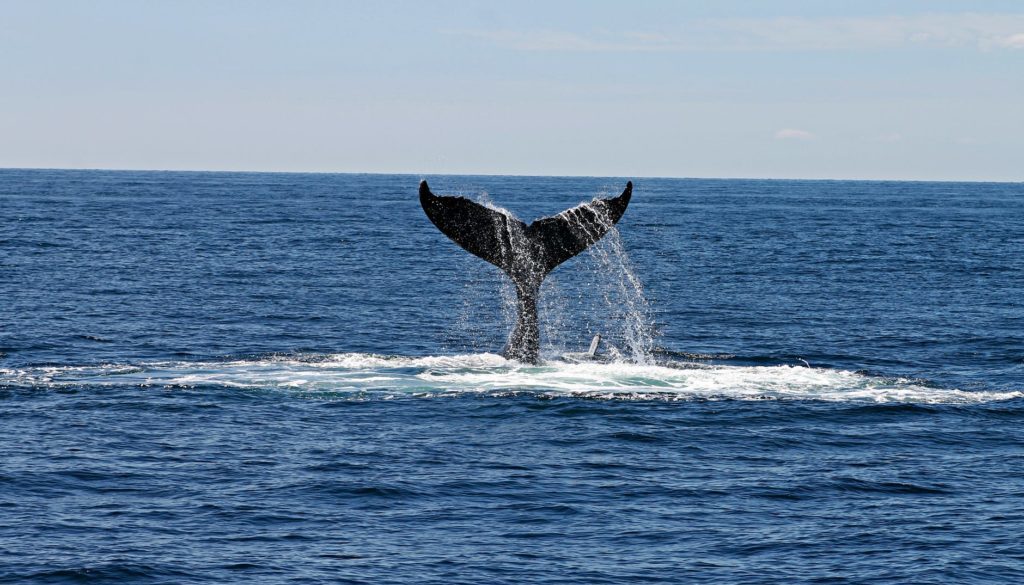NOAA Urged to Protect Right Whales From Deadly Entanglements
By Francine Kershaw, Natural Resources Defense Council
NRDC and the broader environmental community has come out in force to urge the National Oceanic and Atmospheric Administration (NOAA) to protect the critically endangered North Atlantic right whale from deadly entanglements in fishing gear.
Across a six-week scoping period that ended yesterday, NRDC and our members and activists submitted almost 39,000 individual comments telling NOAA (also known as the National Marine Fisheries Service, or NMFS) to take strong and effective measures to significantly reduce the risk of right whales experiencing serious injuries and mortalities in U.S. fisheries.
We also spoke up for right whales at several in-person scoping hearings that were held across the Northeast, including Portland ME, held a rally prior to a scoping hearing in Gloucester MA, and made our voices heard in the local press.

Credit: NRDC
NRDC’s Marine Mammal Protection Project also submitted a detailed comment letter summarizing the dire conservation status of the right whale and the role of U.S. fisheries in their decline. The letter details our six main recommendations to address the problem, including the need for new fishing-area closures and a roadmap to ropeless fishing systems, and underscores NOAA’s legal obligations to immediately take action to protect the species.
You can read the full letter here.
Our scoping comments will collectively inform the development of NOAA’s upcoming Environmental Impact Statement (EIS) for amendment of the Atlantic Large Whale Take Reduction Plan, and a subsequent Proposed Rulemaking, which will lead to new fishing regulations to protect right whales from entanglement over the coming years.
We need to make sure the new fishing regulations issued by NOAA are as strong and effective as possible if right whales are to survive. There is no room for error.
Entanglement in fishing gear, and primarily the vertical buoy lines that mark the location of pot and trap fishing gear used to catch lobster and crab, is the leading cause of death and serious injury for North Atlantic right whales. Entanglement also negatively effects their health, impairs their ability to reproduce, and may cause them to slowly starve to death over months or even years.
There are only about 400 right whales left and fewer than 95 of those are breeding females, the lifeblood of the species. Without immediate action by NOAA to reduce the risk of entanglement in vertical lines, and particularly in the American lobster fishery, we will lose our iconic East Coast whale within mere decades.
The urgency of the situation is only underscored by the heartbreaking news of yet another dead right whale just found off Long Island, NY; the ninth confirmed death this year and the first to be found in U.S. waters. Unfortunately, these documented deaths represent the minimum number of actual right whales that are lost.

Credit: Sea to Shore Alliance / NOAA Permit #20556
Entanglements do not only occur in the U.S. fisheries. The thick, heavy ropes used by the Canadian snow crab fishery are also responsible for a significant number. Since January 2016, seven right whales have been found killed or seriously injured due to entanglement in Canadian snow crab gear. Canadian fisheries also adhere to relatively fewer protective regulations compared to U.S. fisheries.
To help address this problem, NRDC has joined several other environmental groups in sending a letter to NOAA arguing that Canada does not meet “U.S. standards” of bycatch reduction and urging NOAA to press the Department of Fisheries and Oceans Canada to do its part and adopt stronger and more permanent protections for right whales. Under the Marine Mammal Protection Act, any nation that fails to meet U.S. standards shall face a ban on imports of their relevant seafood products to the lucrative U.S. market. Improved regulations to reduce bycatch in Canada will help them avoid a potential seafood import ban in 2022.
You can read the letter here.
There is no more time for finger pointing. Both the U.S. and Canada need to do better if we are to save right whales from extinction. And there is no time to waste on either side of the border.

